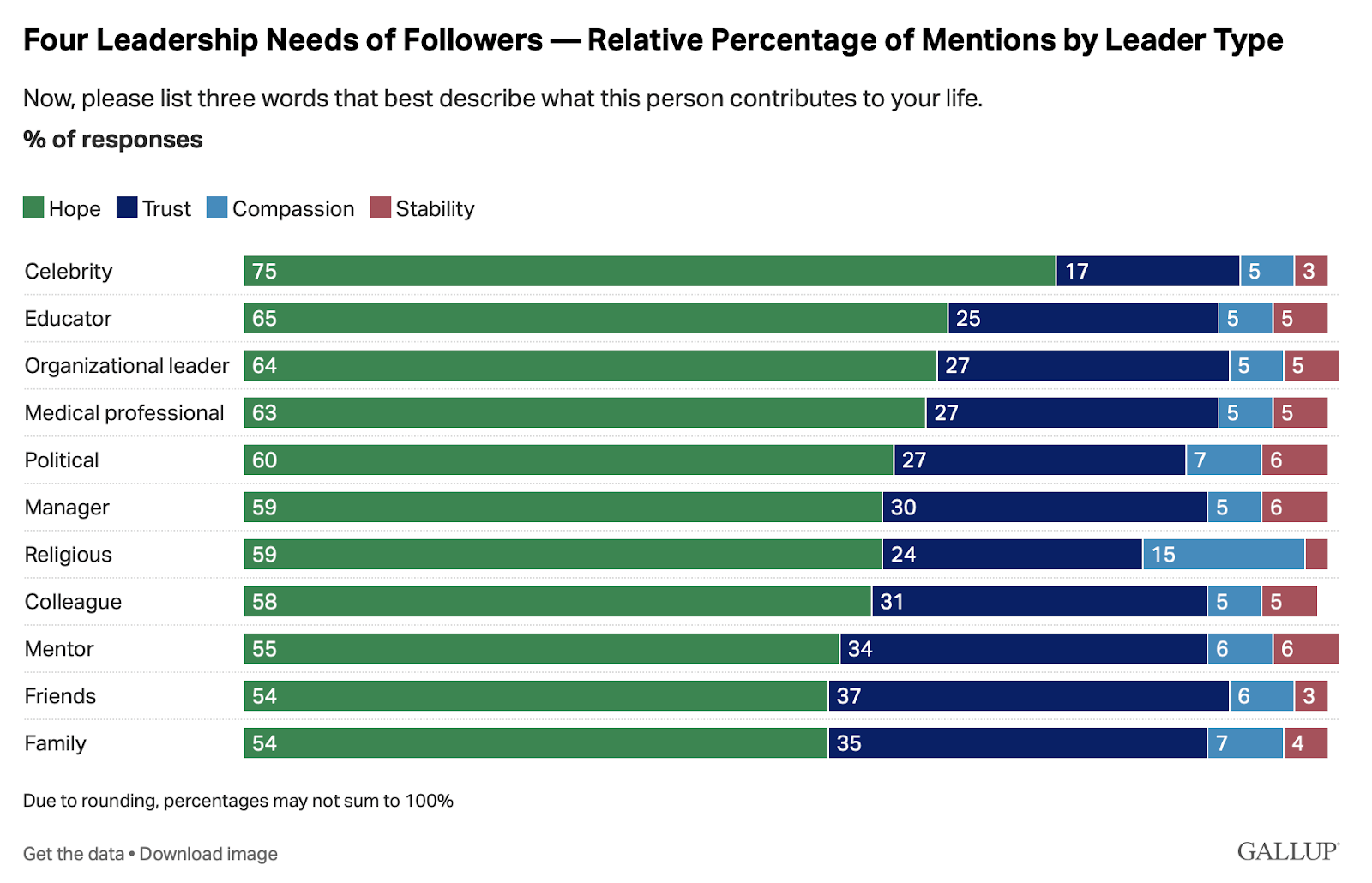Future Design Inquiries. March 2025

This month: Fear as an antidote to action, what people want most from their leaders (hope), orientation in revolutions, the abundance agenda in housing, Unilever and the case for better capitalism, why listening matters, random acts of kindness, Plutchik’s wheel, Station Q, how Olipop beat OpenAI, and teaching empathy.
Hello from your friends at enso, a future design company. Futures happen by default or by design. Here are some things we think push past the default. And we welcome your reactions, additions, and suggestions – reach out news@enso.co.
For anyone new, we’re sharing the things that make us think, bring us joy or shift our perspective.
If you no longer wish to receive our periodic updates, you can unsubscribe by clicking the link at the bottom of our emails.
What we’re reflecting on
These nuggets are curated by enso partners Hanna Siegel (HS) and Sebastian Buck (SB).
The antidote to fear is action
Does anyone else feel like we as a society are on the world’s most unsafe rollercoaster, careening towards who knows what? Fear is everywhere – what is going on? We are getting caught in what Amanda Ripley calls ‘high conflict.’
“Under its spell, people do things that appear to others to make no sense. Sometimes they mimic the behavior of their opponents without realizing it (ie fight violence with violence!). Eventually, everyone…starts to harm whatever they went into the fight to protect…In ugly divorces, couples desperate to protect their kids from one another can end up putting them through a living hell. Journalists, devoted to protecting the free press, can end up behaving so righteously that they ensure their own irrelevance. And politicians, hellbent on reforming a bureaucracy, can leave it broken and corrupted.”
So how do you manage the fear in 2025? One place to start is to stay out of high conflict – don’t perpetuate the cycle. Don’t do the same thing as the other side, and assume that because your cause is good, it will yield a better outcome. The next step is purposeful action. Fear comes from uncertainty and helplessness. Uncertainty is the world we live in. But we are never helpless. Taking action, specifically action that is constructive, meaningful, and directed toward progress, can be a powerful reminder of the agency we have. At its worst, fear can become a mindset. So when you feel yourself slipping, take a step forward. Do something—however small—that creates momentum: for yourself, for your family, for your community. Purposeful action is the antidote to fear. (HS)
Hope Wanted
Gallup just released a study asking people what they want to see from their leaders. Across 52 countries and many demographics, the answer is as simple as it is consistent: they want hope. Whether it is a political leader, a CEO, a medical professional or a mentor, hope is the dominant need people have of their leaders today. Yet at first, there were so many other options that crossed my mind. Security, for one. Competence. Intelligence. Ethics. Confidence. But none of these even cracked the top four. In fact, after hope, people want trust, compassion and then stability, in that order. It’s a reminder that being a great leader isn’t rocket science. It doesn’t require being the ‘smartest person in the room’ and it doesn’t require beating earnings projections every quarter. The best leaders are the ones that excel at the most human of qualities, especially at this moment in time. Simply put, without hope, we can’t move forward, but hope is a precious resource right now. It’s up to our leaders to fuel that march towards a better future. (HS)

Orientation in revolution
There’s something both grounding, and dizzying, in Fareed Zakaria’s Age of Revolutions. Grounding: because it distills the actions and reactions that have shaped civilization. Dizzying: because in ~300 pages, he covers nine revolutions and underscores humanity’s prodigious capacity for ideologically-driven conflict. He highlights some patterns relevant to today’s world. Gradual, bottom-up revolutions (like the industrial revolution’s ‘tinkerers’) tend to outlast rapid, top-down upheavals (like Robespierre’s French Revolution). Another, quoting Kenneth Clark’s observation about Rome’s collapse, “lack of confidence, more than anything, destroys civilizations. We can destroy ourselves by cynicism and disillusion, just as effectively as by bombs.” Optimistic, bottom-up progress, over cynical, top-down regression. A useful reminder that enduring change comes from those who build, adapt, and bring people along. (SB)
Abundant housing
Moving home has long been a marker of economic mobility, matching workers with opportunities and fostering diverse relationships that strengthen the social fabric. ‘Howdy, stranger’ is a pleasing Americanism—one rooted in a historically mobile culture. In the 19th century, one in three Americans moved each year; by the 1960s, it was one in five. By 2023, just one in 13.
What changed? Yoni Appelbaum’s fascinating article charts a wave of restrictive housing policies—starting with a single house in Manhattan’s West Village, that resulted in a deficit of about 30 million homes in economically vibrant areas. It’s hard to take that Silicon Valley job if you can’t find a home. But as with other proposals in the Abundance Agenda—an effort to remove artificial constraints on progress—the solution isn’t to subsidize demand, but to unlock supply (in this case, by reversing NIMBY-led building restrictions). Appelbaum concludes with this: “The genius of the American system was never that its leaders knew what was coming next, but rather that they allowed individual people to decide things for themselves, so that they might collectively make the future.”(SB)
The case for better capitalism
I can’t help thinking that those of us working to reimagine capitalism aren’t doing a good enough job. If people felt capitalism was working for them, we wouldn’t see the rise of reactionary populism. Part of the problem is branding—new labels appear every few months—but a bigger issue is telling the stories of progress. A striking example comes from Unilever. Under CEO Paul Polman, the company embraced a ‘Sustainable Living Plan’ that aligned its mission with its business strategy. During his decade-long tenure, Unilever’s stock rose 125%—or 290% with dividends reinvested. Since he left, and the company retreated to a traditional shareholder-primacy model, the stock has grown just 6.8% over seven years, and its latest CEO lasted just two years. The contrast is clear: bold, mission-driven leadership outperforms short-term optimization. Nike’s CEO history tells a similar story. Capitalism isn’t broken, but it needs better stewards. The future belongs to leaders who think beyond quarterly earnings and align bold missions with long-term value creation. (SB)
Listening Matters
As a society, it seems that we have forgotten how to really listen to others' perspectives. Today, nothing is more important than the ability to listen carefully and learn from people who are different from you. That's why, at Enso, we begin our problem-solving process with deep listening that broadens our perspective and helps us see each problem as part of a bigger picture. This video demonstrates this curiosity in action.
11 things that made us think, gasp, share and laugh:
- ‘Share overheard compliments’ and 85 more random acts of kindness
- For generations, humans have bred sheep to be white; the few black sheep shunned. One farmer in New Zealand created an entire herd of black sheep, then partnered with Loro Piana to create Pecora Nera — the most stunning undied brown and black wools.
- Explore your emotions with Plutchik’s wheel; for instance, optimism is the intersection of serenity and interest. (Thanks to our friend Alli Magidsohn for this!)
- You may have heard that Microsoft discovered a new state of matter (ie, solid, liquid, gas … and now ‘topological qubits’) in its pursuit of quantum computing. The lab that did this work is called Station Q in Santa Barbara; it has a pleasingly Hawaiian-shirt-surf-tech vibe, that feels like a throwback to recent history when the technology industry was more optimistic and curious, and less about malevolent attention engineering.
- Would you rather have invested in OpenAI or Olipop, the ‘healthy soda’? While OpenAI dominates the news, Collaborative Fund showed how Olipop beat OpenAI as an investment. In a race of ‘artificial’ and ‘intelligence’, there’s something satisfying about ‘natural’ and ‘health’ still having a game to play.
- The loveable, hapless, Oscar-nominated heroes, Wallace & Gromit are brought to life with such remarkable creativity and craft. “The animators are trying to do five seconds a week, is the target.”
- This gorgeous Philip Johnson house, currently on the market if you have $2.9M to spare.

- Doing something you’re bad at can make you better at something you’re good at
- How to teach empathy
- Future Library is a project from the artist Katie Paterson. A forest planted in Norway, which will supply paper for a special anthology of books to be printed in 2114 (100 years after the project began). Between now and then, one writer every year will contribute a text, with the writings held in trust, unread and unpublished, until that time. Writers to date include Margaret Atwood (2014), David Mitchell (2015), Sjón (2016), Elif Shafak (2017), Han Kang (2018), Karl Ove Knausgård (2019), Ocean Vuong (2020) and Tsitsi Dangarembga (2021). Watch a series of films interviews with the authors, and their Handover ceremonies, here.
- What does Slow Travel look like? Instead of running from activity to activity, stop and sketch what you see
What we’re working on
enso is a small, senior team so that we can work on just a few initiatives at a time. This allows us to go deep on some of the biggest challenges/ opportunities. Recently, we’ve been working on a few main missions with our partners:
- Enso’s ideas: This newsletter is part of an effort to get our ideas out there, and to find others who want to explore and design with us. We’re wrestling with our thoughts in public – on our new ideas page.
- Engaging with the world’s talent leaders: How can we collaborate with leaders worldwide to build the future of work?
- A new enso website: We are a future design company that drives growth and positive impact that scales. We’ve been designing capitalism that works better for the last 12 years – learn about us, what we do and why we do it.
- Working to change the trajectory of climate change: Finding a way to turn the incredible research, education and innovation into a new future for the planet, and for us.
- Supporting one of the fastest-growing industries – e-commerce: Reimagining what it means to be a small business in a globalized, digital world.
- A brand to radiate optimism: We think restoring optimism in the world is essential. We're exploring building a product, content and community brand around this idea.
Want regular inquiries? Subscribe here to get our thoughts in your inbox every so often.
See you next time.

Enso • 115 W California Blvd #9101 Pasadena, CA 91105
